|
|
|
Sort Order |
|
|
|
Items / Page
|
|
|
|
|
|
|
| Srl | Item |
| 1 |
ID:
132917
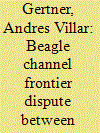

|
|
|
|
|
| Publication |
2014.
|
| Summary/Abstract |
The Beagle Channel crisis (1977-1984) unfolded in a global political context. In other words, it was never solely a bilateral matter between Argentina and Chile, as many analyses have suggested. From the international arbitration to the participation of a third actor (the Vatican), the role of the United States, the Falklands war and the United Kingdom, the Beagle crisis had pronounced regional and international dimensions. Domestic structures and international conditions affected the Argentinian and Chilean foreign policies to different degrees. The Beagle crisis resolution has been explained by reference to the key role played by the Vatican. However, recently declassified US documents and interviews with key actors reveal a different story. International sanctions for human right violations were affecting both countries' leverage in the international community and creating internal political problems. This finding suggests that both countries were keen to use mediation as a strategy to remove human rights violations from the US agenda.
|
|
|
|
|
|
|
|
|
|
|
|
|
|
|
|
| 2 |
ID:
132914
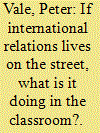

|
|
|
|
|
| Publication |
2014.
|
| Summary/Abstract |
The argument asserts that International Relations (IR) was (and remains) constructed to serve the interests of the knowledge courts of the north. In South Africa, the discipline is an 'alien species' because the imported idea of sovereignty not only disrupted natural patterns of regional migration, but the formation of the region's first state, the Union of South Africa, divided the country's people on the grounds of race. The coming of the Union followed upon both the Jameson Raid (1895/1896) and the Boer War (1899-1902) - the former was of interest to E.H. Carr in two instances but only as an attempt to explain events in the global north. The 'new' politics of southern Africa, which were based on sovereignty and the rise of Afrikaner Nationalism were ignored by Carr. The migration of IR to South Africa in the 1930s rested in an imperial frame, and the discipline helped create a European state in Africa. The author uses several autobiographical examples to suggest his own dissatisfaction with this condition by using Carr's notion of 'site-specificness'. The primacy of English in IR is critiqued because this language closes off perspectives of the international which are carried in other languages. The article concludes with a discussion of the way in which 'First People' are excluded by the deliberations around IR.
|
|
|
|
|
|
|
|
|
|
|
|
|
|
|
|
| 3 |
ID:
132918
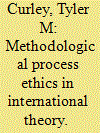

|
|
|
|
|
| Publication |
2014.
|
| Summary/Abstract |
In this review essay, I identify a commonality between Patrick Thaddeus Jackson's The Conduct of Inquiry and Daniel J. Levine's Recovering International Relations: an ethical methodological process to organize international theories in ways that promote a plurality of visions. Jackson's ideal-typification of the various methodological approaches in international relations encourages a pluralistic science. Likewise, Levine's constellation method demands a multiplicity of theoretical perspectives, in order to sustain the critical elements intrinsic to each. As I argue, this shared methodological process ethic not only advances theoretical pluralism but, in so doing, actively opens thinking space for constructing alternative political realities.
|
|
|
|
|
|
|
|
|
|
|
|
|
|
|
|
| 4 |
ID:
132915
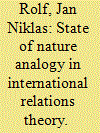

|
|
|
|
|
| Publication |
2014.
|
| Summary/Abstract |
Today, the domestic analogy is a well-established and frequently used term in the discipline of International Relations (IR). What is less established is that often two different analogies are hiding behind this term - an analogy between the domestic and the international realm, on the one hand, and an analogy between a state of nature and the international realm, on the other hand. This article argues that only in the former case, we can speak of domestic analogy. In the latter case, the 'state of nature' is mistaken for the 'domestic', which, on closer inspection, are converse terms. After a critique of the way in which the domestic analogy has been used in the literature, and in the work of Chiara Bottici in particular, I develop the alternative concept of the state of nature analogy and locate it within each of Martin Wight's three traditions of international theory. Once we have unraveled the two analogies, the advantages of using the state of nature analogy over the domestic analogy become manifest.
|
|
|
|
|
|
|
|
|
|
|
|
|
|
|
|
| 5 |
ID:
132922
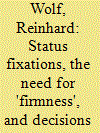

|
|
|
|
|
| Publication |
2014.
|
| Summary/Abstract |
According to a recent monograph on the Great War's origins, the July crisis of 1914 may very well be 'the most complex event of modern times'.1 Hence, it is next to impossible to track all the causal effects and interactions, let alone to specify their relative importance. Moreover, even a comprehensive picture of these causal relations in itself would hardly answer our most relevant questions and thus uncover 'the truth' about the origins of the war. Given our diverse perspectives on the meaning and constraints of human agency in a particular cultural context, such a comprehensive picture would not lead to a consensual understanding of the key decisions and their underlying motives - and perhaps not even to an agreed list of those decisions.2
|
|
|
|
|
|
|
|
|
|
|
|
|
|
|
|
| 6 |
ID:
132919
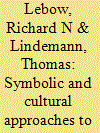

|
|
|
|
|
| Publication |
2014.
|
| Summary/Abstract |
This forum offers a symbolic and cultural approach for understanding the outbreak of World War I that stresses the interactional and symbolic-cultural aspects of German decision makers' brinkmanship during the July crisis of 1914. Contrary to excessive structuralist accounts, the contributions focus on what actors 'do' and 'feel' during a crisis. In the German-Austrian case, symbolic interactions during the July crisis were strongly marked by challenges to the 'face' of decision makers. The second theme of the Forum is to question the purely 'material' nature of those structures traditionally referred to as permissive for World War I. Structures, in fact, are symbolic, too. Like theories on status discrepancy, the Forum stresses the impact of 'responsibility gaps'. However, the contributors also point to the emotional aspects and internal legitimacy problems caused precisely by those status lags.
|
|
|
|
|
|
|
|
|
|
|
|
|
|
|
|
| 7 |
ID:
132916
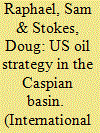

|
|
|
|
|
| Publication |
2014.
|
| Summary/Abstract |
President Obama has continued to emphasise the strategic importance of stable energy supplies to US national security interests, with the oil-rich Central Asian region a key part of global energy markets. This region has seen significant economic and strategic inroads by the United States over the last decade in a broad attempt to integrate it within the US-led liberal order. This article examines these policy developments and draws upon theoretical debates on US grand strategy to argue that, rather than necessarily signalling increasing geopolitical rivalry with other powers such as China and Russia, US policy is designed primarily to incorporate the region through deepening market interdependence. As such, while there is a complex mix of geopolitical rivalry and economic interdependence developing in the Caspian, even in the face of purported US decline and increase of its domestic supplies through fracking, Washington remains committed to acting as a hegemonic stabiliser in the Caspian.
|
|
|
|
|
|
|
|
|
|
|
|
|
|
|
|
| 8 |
ID:
132920
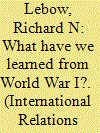

|
|
|
|
|
| Publication |
2014.
|
| Summary/Abstract |
World War I has an important and complex relationship with international relations (IR) theory. The War was the catalyst for the emergence of IR as a discipline and helped to shape the liberal and realist paradigms. The War was also a principal focus of many IR theories. Realists and liberals based theories on it or justified them by arguing that they could account for its origins. Finally, the War influenced theory development in these and other paradigms through new understandings of it developed by historians. These interpretations in turn were often driven by contemporary political problems and projects. Theory, World War I, and the contemporary world are accordingly linked in direct and indirect ways. I cannot possibly unpack this relationship in a short essay. Rather, I want to illustrate with a few examples of the way in which contemporary political events and intellectual developments have encouraged new understandings of World War I. That conflict emerges as a resource, but one used in so many ways that it increasingly comes to resemble a Rorschach Test.
|
|
|
|
|
|
|
|
|
|
|
|
|
|
|
|
| 9 |
ID:
132921
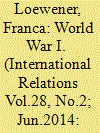

|
|
|
|
|
| Publication |
2014.
|
| Summary/Abstract |
Since the beginning of the investigation into the origins of World War I, it has been claimed by researchers and politicians alike that the 'Great War' could have been averted had German decision makers not misperceived the structures of power. More specifically, it has been argued that German policy makers, while seizing the Bosnian window of opportunity for either preventive or expansionist aims,1 underestimated Great Britain's and Russia's willingness and readiness to intervene in the Sarajevo crisis of 1914.2 As a result, World War I appears to be the result of an accidental failure in deterrence.
|
|
|
|
|
|
|
|
|
|
|
|
|
|
|
|
| 10 |
ID:
132924
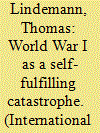

|
|
|
|
|
| Publication |
2014.
|
| Summary/Abstract |
It is a quite common conviction in international relations (IR) theory that what George Kennan called the 'original catastrophe' was predetermined and unavoidable. These explanations of World War I consider the conflict primarily as an inevitable by-product of material structures.1 On the one hand, are those who emphasize the impact of international system's constraints on state behavior - rigid alliances, bipolarization between great powers, the arms race, rivalry dynamics and so on.2 Yet, others regard countries' domestic structures as fundamental component in the outbreak of a diversionary war.3 If taken too far, these approaches can imply that the war was both rational and inevitable in that it was the logical consequence of internal and external tensions. Most importantly, these perspectives fail to take into account leaders' corresponding representations and narratives of 'material' reality and their role on the decision-making process. This essay devotes special attention to the hitherto neglected narrative dimension of World War I.4 In the following, I will propose a new interpretation for German brinkmanship during the July crisis.
|
|
|
|
|
|
|
|
|
|
|
|
|
|
|
|
| 11 |
ID:
132923
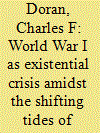

|
|
|
|
|
| Publication |
2014.
|
| Summary/Abstract |
Today, as throughout history, a 'single dynamic' of structural change is shaping the power cycles of all of the great powers - and the expectations that each state has about its future security and foreign policy role.1 Across the six centuries of the emerging modern state system, states have competed for relative power share, attempted to advance foreign policy roles, and struggled against the 'bounds of the system' (finiteness of share) that limits and contours each state's cycle of relative power and its possibilities for role gratification. Projections of future power, role and security are embedded at each historical point on the coevolving power cycles, reflecting the emergent 'trends of history' and 'shifting balance of world forces' experienced by statesmen and assessed in economic and diplomatic history. Implicit in the expression 'peaceful rise' that permeates discussion of the rise of China today is the coded question: Will the world this century repeat the mistakes of the early twentieth century, mistakes that fueled the spiral into World War I (WWI)? For founders of the field of international relations (IR) and world statesmen
negotiating international regimes, witnesses to that catastrophe, the quintessential problem confronting statecraft was how to integrate an increasingly powerful great state into the existing global balance of power and community of nations itself experiencing the challenges and uncertainties of structural change - the so-called dilemma of peaceful change.
|
|
|
|
|
|
|
|
|
|
|
|
|
|
|
|
|
|
|
|
|